To revisit this article, visit My Profile, then View saved stories .
- Backchannel
- Newsletters
- WIRED Insider
- WIRED Consulting
Julia Powles

PHD comics' Jorge Cham on misery, hope and academia
Jorge Cham, creator of the cult comic strip Piled Higher and Deeper , or PHD, is probably the most gut-achingly funny/tragic counsellor you could recommend to a PhD student -- or to any confounded friend, lover, or parent trying to understand what he terms, with some flourish, the "global misery phenomenon" of graduate school.
Cham is a full-time cartoonist, but the deep scars wrought by a PhD programme (in robotic engineering) remain his constant muse.
His webcomic has been running since he started grad school in 1997, is syndicated worldwide, and attracts a loyal following among that peculiar breed of poorly-paid, slightly masochistic overachievers, bravely hunting the frontiers of knowledge, free food, most random societies on campus, and unrequited supervisor approval.
PHD follows the travails of four main characters in grad school: the nameless, hapless hero that bears considerable resemblance to Jorge; Cecilia, the reluctant geek constantly frustrated by undergraduates; Tajel, the free-living social sciences student always willing to rally for a cause; and Mike Slackenerny, that person -- every research group has one -- who has been there longer than anyone can remember. The students' harried encounters with the demanding, loveless Professor Smith and absent-minded Professor Jones form the foundation for many priceless recurring gags, poking fun at the lows of grad student life.
Recently, Jorge was in the UK on an academic world tour , talking about 'The power of procrastination'. His thesis has something for all of us -- grad students and otherwise.
The power of procrastination
"The first thing to note", says Cham, "is that procrastination is not the same thing as laziness. Laziness is when you don't want to do anything. Procrastination, its close but distinct cousin, is when you don't want to do the one thing you really ought to be doing, right now. It's not that you don't want to do it, it's just that you find doing everything else possible, from some completely obscure hobby to categorising the entire internet, like the Yahoo dudes did when their supervisor was on summer break, more appealing."
How much time do you spend on a given comic?
I doodle and brainstorm on a notebook I always carry with me. It can take anywhere from five minutes to eight hours to work out a comic. Drawing it on the computer (using a Cintiq) usually only takes one hour.
Simon Singh has written a whole book about mathematics and The Simpsons . Have you got some examples of deep-coded nerd gags in your comics?
I always try to generalise things because my audience spans so many disciplines, but I do have a running gag that pi/2 is always the answer, and I've lost count how many times I've hidden 1.57 into my comics over the years.
Can you give away anything about your characters?
Increasing the ratio of female professors is a big topic I hope to address in the future. The nameless grad student was given a name in The PHD Movie (the film adaptation of the comics), but it's not clear yet whether that's canon or not.
The comics will eventually follow the characters to the completion of their time in grad school. One graduated several years ago (and is now a Post-doc), and I think another will graduate in the next year or two.

Lauren Goode

Angela Watercutter

Madeline Ashby
You mentioned The PHD Movie . I've heard there's a sequel in the pipeline. Tell us about it.
Yes, we're trying to make a sequel to The PHD Movie ! A few years ago we made what I think is the first independent movie adaptation of a webcomic, and it was a great success in the academic world. It screened at over 500 universities and research centres worldwide (including Antarctica) and got great reviews.
Recently, I've gotten a lot of inquiries whether we're going to make a follow-up so I decided to give the fans a chance to make it happen by launching a Kickstarter . What's different about these movies is that they involve real scientists, researchers and staff members at a real top university (Caltech) in the acting and producing roles.
Part of the message we want to convey is that people in academia are not robots, that they have different passions, talents and even a sense of humour. So, the movie is in the hands of the internet to make it a reality.
Do you have a favourite PHD series?
I started listing out some of my favourite series, but then I realised another reason it's great to be a creator online is that it sort of doesn't matter how many people appreciate any particular piece of work you do. As long as you create something that has meaning to you, you will most likely find others who also connect with it, and the connection will probably be deeper than if you tried to create something that you think everyone would like. It's also easier to take risks because if people didn't particularly like something you did, you have your whole archive there for people to also sample and find something they like.
Is there one comic that stands out as particularly special to you?
One particular comic I've done that comes to mind is a version of Alice in Wonderland where Cecilia gets pulled through her monitor into Thesisland, as a metaphor for her feeling lost on her research. It's a series of comics I feel that works on different levels (character, arc, story, artwork, punch-lines). I also wrote and drew them during the first few weeks my son was born, so it's special also because I was somewhat inspired by that. It's not one I'm particularly famous for, but every once in a while someone will come up to me to say it's their favourite too.
You can see the 11 part series online, starting here and ending here .
The PHD Movie is available to watch for free all this month . You can fund the sequel through this Kickstarter campaign
This article was originally published by WIRED UK

David Gilbert

Meghan O'Gieblyn

Jason Parham

Matt Burgess

Megan Farokhmanesh
20 Comics Follow the Lives of Graduate Students and the Challenges of Academia

The lives of graduate students are a unique blend of academic rigor, personal growth, and numerous challenges. These individuals are pursuing advanced degrees, such as Master’s or Ph.D. programs, and are deeply involved in research, teaching, and scholarly activities. While the pursuit of knowledge and expertise is rewarding, the path to academia is rife with its own set of challenges.
Graduate students are committed to their academic pursuits. They spend countless hours conducting research, reading scholarly articles, and preparing for exams or comprehensive assessments. The intellectual demands are high, and they must continually push the boundaries of knowledge in their field. “ PHD Comics ” perfectly captures the lives of graduate students and the challenges of academia. The comics provide a humorous and relatable window into the world of higher education, resonating with graduate students, researchers, and academics who understand the unique struggles and idiosyncrasies of academic life.
Credit: PHD Comics
For more info: Instagram | Facebook | Website
#1. How’s it going?

#2. Lab Safety

#3. Manuscript

#4. Academic edition

#5. Academic conclusions

PHD Comics, also known as Piled Higher and Deeper , is a web comic strip written and drawn by Jorge Cham . It follows the lives of several graduate students as they navigate the challenges of academia. The comic is known for its humor, insight, and relatability. PHD Comics was launched in 1997 and has quickly become a favorite among graduate students and academics alike. The comic has won numerous awards, including the Web Cartoonists’ Choice Award for Outstanding Comic Strip. He has a strong online presence through their website and Instagram account, where he has an audience of 234,000 followers.
#6. Vacations

#7. Posting on Instagram

#8. Lifestyle Influencer

#9. Different Nightmares

#10. Personal Projects

#11. Drawing

The comics humorously depict the everyday struggles, challenges, and quirks of life in academia. They often touch on topics such as research, teaching, publishing, conferences, and the academic job market. The series features a set of recurring characters, each representing different facets of the academic world, including the graduate student, the advisor, and the postdoctoral researcher. These characters are relatable to anyone who has been through or is currently in academia. Jorge Cham’s art style is simple and distinctive, making the comics easy to recognize. The characters often have exaggerated features and facial expressions, adding to the humor.
#12. Social media

#13. What about research?

#14. That’s a valid career goal

#15. What’s this?

#16. Google is bestfriend

Cham experienced firsthand the trials and tribulations of graduate school, including the long hours, intense research demands, and the emotional rollercoaster that often accompanies doctoral studies. He found that humor was an effective way to deal with the stress and challenges. Creating the webcomic served as a form of catharsis for Cham. By turning his experiences into humorous and relatable comic strips, he was able to share his frustrations and triumphs with others who were going through similar experiences. This allowed him to find humor in the often absurd world of academia.
#17. Different Views

#18. There’s a conference

#19. Can’t Avoid

#20. Still Dreaming

Share your love
Related posts.

20 Amby Comics Shows Her Relatable Experiences as a Young Woman

20 Relatable Comics Based on the Artist Nicholas and His Doubts

20 Secret Goblin Comics Full of Random Jokes and Clever Punchlines

20 Times A Female Artist Shares Her Experiences in a Relatable Way

20 Toothy BJ Comics Full of Surprising Twists and Unpredictable Endings

20 Times a Female Artist Shows Her Everyday Life With Her Pig

20 Dead Face Comics Based on Themes of Loneliness and Depression

20 Cheroo and Chim Comics Based on Adorable Moments Happen in Love

20 Simon said Comics Full of Dark Humor To Tickle Your Funny Bone

20 Marginally Creative Comics Full of Clever Jokes That Will Make You Laugh
About the author.
shahzaib ali
Leave a comment cancel reply.
Your email address will not be published. Required fields are marked *
Save my name, email, and website in this browser for the next time I comment.
- Show Spoilers
- Night Vision
- Sticky Header
- Highlight Links

Follow TV Tropes
http://tvtropes.org/pmwiki/pmwiki.php/WebComic/PhD
Webcomic / PHD
Edit locked.
The comics depict the typical life of graduate students in Stanford University: how they obsess about ever getting their theses completed, struggle to make ends meet with their meager stipends, wonder why life is passing them by, and slack off while their supervisors aren't looking.
Contains examples of:
- Absent-Minded Professor : Almost all of the Research Advisors introduced. They can barely remember the students' name, and hardly ever bother to read their thesis draft.
- Adaptation Name Change : Cecelia's advisor Professor Jones is named Professor Chu in the movies.
- All Issues Are Political Issues : Tajel often carries protest signboards for various causes.
- Ambiguously Brown : Dee's friend has a dark skin, but he has no name or distinctive features to determine his actual race (unlike Tajel, who we know is half-Indian from her mother).
- Batman Gambit : During Cecelia's thesis defense in the second film, her advisor Professor Chu gets an adversarial committee member to endorse her thesis by agreeing with him that an additional year of work is needed, knowing that he will change his mind to be Commander Contrarian .
- Bread, Eggs, Breaded Eggs : The "How You Spend Your Time" pie chart has a Sports & Leisure section which consist of surfing the internet, doing sports, and reading about sports while surfing the Internet.
- Call-Back : Mike teaches the protagonist how to distract with graphs, which unfortunately doesn't work too well for him. Mike himself does it over a year later, with more success.
- When we see Tajel interact with Prof. Rivera for the first time, he was lamenting her lack of apparent seriousness in her studies, especially when she chose to write about "The Grad student of Academia" for her research topic. Nowadays, their dynamics are reversed, as Rivera becomes the most egregious example of Absent-Minded Professor who never reads Tajel's draft and gives her useless advice, while Tajel desperately tries to get his support in writing her thesis.
- Professor Smith changed too. Originally he was The Faceless , then started to become more of an Absent-Minded Professor who tries to blend in with the students despite being clueless of their trends. Later, he just became a professor with a serious Lack of Empathy .
- Chekhov's Gunman : Early in the second movie, Allison points out Dr. Dukosky as the founder of their field, but the latter is surrounded by other conference attendees at the time and cannot be seen. Later during conference presentations, the Nameless Hero has a casual conversation with an old lady who turns out to be Dr. Dukosky, and she provides him with helpful advice in a subsequent scene.
- Child Prodigy : Professor Jones's daughter is only a first year in elementary school, but is intelligent enough to fix Mike's research data.
- Comic-Book Time : Every year, the strip features the characters celebrating birthdays, summer vacations and various holidays, but despite their constant complains that they're never graduating, they never seem to actually age. Cecelia lampshades this in one of her birthday strips, in which she decided that the time she spends in grad school doesn't count to her age, because it's basically living in a vacuum.
- Cool Old Lady : The second movie has Dr. Dukosky, the highly respected founder of the Nameless Hero's field of study, who takes the time to strike up a friendly conversation with him and offers him advice.
- Scott all but disappeared from the storyline after he broke up with Cecilia.
- Played for Laughs with Gerard, the token Humanities student, who was told by the PHD Comics management that he should either change his major or leave the comics altogether. He was then forced to attend a hearing to justify his existence, and had not appeared ever since.
- Creative Closing Credits : The first film overlays the credits on top of academic paperwork, accompanied by sketches of the cast and crew in the art style of the comics.
- Cuteness Overload : Most of the campus faculty practically melts at the sight of Mike's baby daughter, Sophy. He exploits this to distract them while he steals food from associations he doesn't belong to.
- Demoted to Extra : In the first film, Mike and Tajel were important supporting characters who gave guidance to the Nameless Hero and Cecelia respectively. In the second film, their roles are diminished, only getting some token lines and scenes that for most part don't directly affect the main plot.
- Divergent Character Evolution : In the earlier strips , all the University professors were portrayed as a collective group of sinister, faceless Hive Mind who goes out their way to make the students' lives more difficult, especially during Quals. Now, they're mostly given distinct appearance and personalities: Professor Smith is still the mean Stern Teacher , Professor Jones tries to be helpful but is often scatterbrained, Professor Rivera is very flippant and easygoing, but doesn't really pay attention to what his students are doing.
- Education Through Pyrotechnics : The machines used for experimental research frequently blow up in people's faces.
- The Faceless : Most of the research advisors don't get drawn in the comic panels, at least in the earlier strips. No longer the case since the 2003 strips.
- Failure Is the Only Option : To keep going, the series needs the characters to remain grad students, meaning they have to postpone the completion of their respective theses indefinitely. Mike ultimately subverts this; having been the oldest grad student for several years, he finally manages to finish his dissertation after years of procrastination and graduate, but stays anyway as a member of the teaching staff.
- Fourth-Wall Observer : Tajel takes this role in the movies. She addresses the audience at the end of both films, and refers to herself as a "secondary character" in the first movie.
- Gag Series : The main point of the strips are to make jokes about the life (or lack thereof) of a grad student, and make fun of the research advisors and Academia in general. When the strips go for more detailed plot and character development, some readers actually complain.
- Ignored Aesop : A Smithmas Carol ends with Smith reflecting on his life's journey and concluding with this: Prof. Smith: Eh, who cares? I've got tenure.
- Limited Wardrobe : Probably justified considering how cash-strapped the characters are. In any case, they are almost always depicted in the same outfits.
- Living Prop : Discussed in-universe regarding the status of grad students. Apparently, the faculty would be more likely to notice an actual missing furniture than they would a missing student.
- Meta Guy : Gerard, the Humanities student Recurring Character , only exists to represent another Grad School department apart from engineering. He's definitely aware of this, and most of his appearances have him address the readers in some way.
- Misery Poker : A humorous variation took place during the PhD widows meeting between Scott and Jenny as they ranted on their respective partners, Cecelia and Mike. Scott: Cecelia seems to have lost her way... She has a lot of work ethic but lacks purpose. Jennifer: My husband, on the other hand, has a baby on the way, but his work is pathetic and slacks on purpose.
- Misplaced Kindergarten Teacher : Cecelia's teaching style has shades of this in the first movie; she prepares baked goods for her students and comes up with an interpretive dance (complete with props and rhymes) to introduce the course material to them. She is eventually discouraged from doing this by the undergrads' seeming apathy, but returns to it enthusiastically once she gets out of her funk.
- Named by the Adaptation : In the movies, the Nameless Grad Student's name is given as Winston.
- Obstructive Bureaucrat : Faced by Mike when submitting his thesis (he has to come back because the layout isn't in perfect conformity with university rules), by Tajel when applying for a visa, and by the main character when trying to get reimbursed for travel.
- Promoted to Love Interest : The second film pairs up Cecelia and Winston (the Nameless Grad Student), though this is only revealed to the audience at the end .
- Recurring Character : Scott. He's Cecelia's boyfriend, but since he's not a Stanford student, he is actually featured less frequently than the nameless Living Props that are the Engineering Grad students. Lampshaded by Tajel when he suddenly shows up after a long absence. "Scott? I feel I haven't seen him in years
- Relationship Reveal : Throughout the second film, Cecelia and Winston (the Nameless Grad Student) are both shown receiving texts from an unrevealed party. It is revealed at the end that they had been texting each other and are romantically involved, following a Ship Tease at the end of the first film .
- Rhymes on a Dime : A lot of the comics' punchlines come from characters bantering with each other in rhymes. One example is the Misery Poker mentioned earlier, and another is the following exchange between Cecelia and her advisor. Cecelia: I have to reference... without deference? Prof. Jones: That's the preference.
- Rhyming Title : Several strips have titles such as "Webcam Labcam" and "What is... a Thesis?"
- Right in Front of Me : Upon meeting Khumalo, Tajel starts chatting him up without realizing that he's her new professor.
- Running Gag : π/2
- Sequel Hook : Near the end of the first film, Mike learns that his wife is pregnant. A sketch of their baby daughter is shown in the end credits, with "Sequel!" written next to her. She does end up appearing in the second film, though only for a brief moment in the opening montage.
- Skewed Priorities : Mike can remember "important stuffs" like who is the colorist for a particular X-Men issue, but forgets to take Quals, which he needed to graduate.
- The Slacker : While several characters are slackers to some extent, Mike Slackenerny stands head and shoulders above the rest in this regard. An eternal student, he's the PhD answer to Doonesbury 's Zonker Harris.
- She also accidentally spurts her drink on Scott when the latter mentioned that he had a job offer in London.
- Starving Student : All of the students, who live off instant ramen, and spend a lot of their time scavenging for free food.
- Mike finally graduated from his Ph.D, but he continues to stick around the campus as a Post-Doc whose activities mostly involve sleeping, napping and scavenging for free food.
- Prof. Rivera left Stanford for a position in another University, but continues to serve as Tajel's adviser. Since he barely communicate with his student or give her useful advice anyway, his departure has no virtually effect to her thesis.
- Still Got It : Prof. Smith when he finds out he can still take a nap balanced on a chair, as he used to do as a grad student.
- Though the supposed take that at Mythbusters makes it abundantly clear that he's never actually watched it and doesn't think about what the actual purpose of the show is (not to prove that something always happens, but to prove if it could happen somehow).
- Two Scenes, One Dialogue : In both films, there's a scene in which Cecelia and the Nameless Grad Student receive the same advice simultaneously from different parties at a pivotal moment. In the first film, the advice is respectively given by Tajel and Mike. In the second, it's given by the emeritus professor on Cecelia's thesis committee and Dr. Dukosky.
- Vague Age : No one really knows how old any of the characters are, since most of them are grad students who have spent countless of years in their program and not showing any signs of graduating soon, despite their constant lament that they're getting older and older as the years goes by. And given that Mike's baby daughter visibly ages over time, the setting probably doesn't run on Comic-Book Time .
- PhD - Episode 1 is based on The Phantom Menace .
- What is... The Thesis? is from The Matrix .
- Raiders of the lost dissertation is Raiders of the Lost Ark .
- Yank the Dog's Chain : During the credits of the second movie, a montage is shown of Mike's attempts to land an industry job during the conference. He is eventually offered a position... only for the employer to retract the offer when Mike starts gratuitously celebrating on the spot.
Alternative Title(s): Piled Higher And Deeper , Piled High And Deeper
- Webcomics Long-Runners
- Sluggy Freelance
- Short Titles
- Ojisan And Marshmallow
- Rooster Teeth Comics
- Penny and Aggie
- School Stories
- Rain (2010)
- Aroused by Their Voice
- ImageSource/Webcomics
- Eating Lunch Alone
- Slice-of-Life Webcomics
- Pixie and Brutus
Important Links
- Action Adventure
- Commercials
- Crime & Punishment
- Professional Wrestling
- Speculative Fiction
- Sports Story
- Animation (Western)
- Music And Sound Effects
- Print Media
- Sequential Art
- Tabletop Games
- Applied Phlebotinum
- Characterization
- Characters As Device
- Narrative Devices
- British Telly
- The Contributors
- Creator Speak
- Derivative Works
- Laws And Formulas
- Show Business
- Split Personality
- Truth And Lies
- Truth In Television
- Fate And Prophecy
- Edit Reasons
- Isolated Pages
- Images List
- Recent Videos
- Crowner Activity
- Un-typed Pages
- Recent Page Type Changes
- Trope Entry
- Character Sheet
- Playing With
- Creating New Redirects
- Cross Wicking
- Tips for Editing
- Text Formatting Rules
- Handling Spoilers
- Administrivia
- Trope Repair Shop
- Image Pickin'
Advertisement:

Culture doesn't fit in a box. Neither do we.
Comics Academe: How To Write a Comics Dissertation
Out there, somewhere, is a woman who writes about comics who wants to turn that writing to a comics dissertation or thesis, or at least I sure hope there is! The field is wide open and ready for more. For the uninitiated, a dissertation or thesis is the long essay or project that serves as the capstone for most advanced degrees (especially doctoral degrees) in the sciences and humanities. There is some degree of coursework or class-type work in most programs, but this is the project that determines whether or not you earn the degree. The nature and form of these projects has been under debate in recent years , but the actual production of some object that concludes the PhD remains a constant. The internet has worked alongside the fast-moving and collaborative nature of digital scholarship in general to jolt the usually slow-to-change academic establishment. By making wide varieties of information more available to a wider public and expanding the possibilities of collaboration, digital forms of scholarship have disturbed the idea of authority. This idea of authority is what allows some group to grant a degree to someone else. You can see why this sort of debate can be disturbing!
What I’ll talk about most here is writing about comics in a dissertation as opposed to writing a dissertation as a comic. Be warned: the minute you start pairing talk of “comics” and “dissertation” people are going to assume you’re writing a comic. For some of you, this will be a fantastic way to go. If your committee has trouble imagining your dissertation as a comic, you might point out Nick Sousanis’s recently published comics dissertation Unflattening . His process bringing the dissertation into comics form is lovingly documented all over the internet by academics and comics people alike, such as here , here , and here . Such a precedent is wonderful to present to a wary committee. If their hesitation comes from fears that you won’t be taken seriously, it’s nice to have a publication from Harvard University Press to point out. Of course, you should listen to your committee, more on them in a moment.
I, personally, want to see more dissertations with/about/using comics in a variety of fields, and I want everyone to have a good time. So, I’m going to offer you some advice. This particular set of advice features an emphasis on surviving a comics-centric humanities-based academic endeavor. I’ve survived it. You can, too, Woman Who Wants to Write about Comics in a Dissertation.
Find Your Peers
If you want to use comics as your subject or a major player in your dissertation, you want find your comics-studying peers as quickly as you can. Especially if you are adding comics to some other academic field, you should start seeing out your comics-peers and comics study well before you are ready to dissertate. Don’t dive in half-ready. Besides doing diligent research on comics themselves, include a search for comics-related dissertations already around.
ComicsResearch.org maintains a list of comics-related dissertations and theses that anyone can access, but use the full power of your university library and databases to seek out a wide array of related projects before you begin your own. I can almost guarantee that you’ll learn something from the scope of the dissertations that have come before yours.
Extensive research before you begin in earnest can assuage what my friends call that feeling of “disencouragement” that comes when you find some work that looks a lot like your thing but not exactly like your thing. You want similar work that assures you you have something to add to an active conversation, not to find that you’re not as original as you thought! Doing this before you solidify your committee can help you figure out who you want on it, as well.
Find Your Committee/Pick Your Audience
The Dissertation Committee in most graduate programs is made of three or four senior scholars who already have the degree you are striving to earn. These people are the gatekeepers for your degree and the primary audience for your project. As such, it’s important to choose wisely. Not every program will have a faculty member that uses comics the same way you do in your work (some day I should write a post about choosing a graduate program).
The head of the committee (the head of your Voltron) is the most important member. You want someone who plays well with other faculty and who has the most depth of knowledge around the particular project you are creating. You want an organized person who answers your emails in a reasonable amount of time and gives you critical feedback. You want them to challenge you. The rest of the committee follows this person. Make sure they are game for the kind of project you are pitching! You want this person to be comfortable criticizing your work and giving you a bit of a hard time. That makes it better. You also want someone who can understand why your work is of value. That makes it better, too.
Committees are hard to put together anyway, but sometimes committees on comics projects can be extra difficult. In the United States, we struggle mightily with a stigma around comics that not only marks them as lowbrow, but in the 1950s, as anti-academic and even anti-American. Many of the people in academia ow grew up around these ideas. Don’t shout them down! Listen to their objections carefully. Take their advice. Make your project better than they expect it is possible to be.
Form a Writing Group
Support for your comics project can come from other areas, too. Your writing group might be gleaned from a group of fellow fans or people you find through social media who share an interest in your niche of the comics world. I found academic friends over at Sacred and Sequential who share my love of both comics and the study of religion. It was great having all these scholars to talk to during the process. Sometimes having confirmation that there are other people out there studying comics seriously was an incredible boost.
Push it FURTHER
Dissertations require an incredible amount of work; make it work that means something to you. Once you’ve done your review of the available literature, try to make your project do something other than what’s been done. Inevitably, you’re going to knock against other people doing this comics work, but the field is still so wide open that you’re also going to find yourself enjoying these brief moments of fellowship with other people who value this work.
We live in a delightful age of interdisciplinarity. The academy is noticing that fields that play well with others have much to offer the world. If you’re thinking, “I’m not getting a fine arts degree, how can I talk about comics in the field of X?”, let me give you an idea: My degree is a PhD in Religious and Theological Studies from a joint program between the University of Denver and the Iliff School of Theology. My concentration is in Biblical Interpretation. Nothing about this screams comics? Hold onto your hats! My dissertation is called “ Imagining the Scandal of the Cross with Graphic/Novel Reading . ” In this study, I read the crucifixion of Jesus through the lens of several modern comics that treat the idea in a range of provocative ways in order to breath life into an interpretation of the views of two New Testament authors. In short, I show how comics can help shake up biblical scholars when their imaginations are stuck.
I think there are plenty of other fields that could use this sort of a shake up in all kinds of ways. After all, if you can think it, there’s a comic about it. I see no reason why there can’t be a dissertation about it, too. Because comics is still a newish field—maybe it’s not that new anymore, but the study of religion and the Bible is either, about 100, around 350, or maybe closer to 1700 years old, depending on how you’re counting. This kind of time gives fields the chance to become established in a way that comics studies is only beginning to enjoy in some places. But, comics studies has a youth that makes it nimble. We have a chance to make the conversation more than defensive and on into something truly meaningful—about the ways we tell our human stories to one another with text and pictures in whatever combination we please.
Don’t Give Up
In every dissertation process—every single one—there is at least one moment where you are going to feel like you are at the end of your writing-rope. Dissertations are painful. Be gentle with yourself. This process requires support from a network of people, some of whom you will know and some of whom you will only read. Draw strength from these people, both the living and the written. Understand yourself as a part of a community of scholars and writers.
If you’re writing a dissertation on comics or with comics or that is in any way comics-related, you’ll find other people can sometimes be a unique challenge. Instead of allowing these nay-sayers to control the conversation in your head, immerse yourself in the work of people who take these fantastic creations seriously, who find them worthy of critique. Find strength in the magic of comics. Let yourself feel a shiver occasionally when you recognize a moment of true invisible art . Don’t give up. The rest of us need your work!
Dr. Elizabeth Coody completed her dissertation in May 2015. She loves her committee. However, she’s still not quite over the experience, and would like to do what she can to help those who follow.
Elizabeth Coody
Leave a reply cancel reply.
Your email address will not be published. Required fields are marked *
This site uses Akismet to reduce spam. Learn how your comment data is processed .

Related Posts
Previously on comics: short, but not sweet, essay: dead at 55: barbara’s zombie chronicles (2004), review: the sensational she-hulk #4-6 – but you gotta have friends.
- Style & Fashion
- Art & Design
- Roundtables
- Con Diaries
- Comics Academe

The Exclusive Or
Advice on how to be creative, productive, and happy as a researcher.
- The three PhD Comic strips that are actually good research advice
If you’re reading this blog, then you already know about PhD Comics . If you really haven’t seen them before, click the link and read them now. They are more insightful and funnier than anything in this blog.
It goes without saying, however, that you should not model your own career on the characters in the PhD comics strip. For one thing, they’ve been in grad school for more than 20 years.
Amazingly, though, there are three PhD comic strips, and probably only three, that are actually good research advice:
Writing your thesis outline. A thesis is daunting. How do you write an entire book over five-plus years? Instead, I like to tell my students to think and plan at the level of individual papers. Basically, you have three content chapters of your thesis, and so if you have three strong papers that fit together thematically, then you set up one paper per each chapter, and there you are! No sweat. I call this the “PhD Comics Guide to Writing Your Thesis.”
Amount of time writing one email . I saw this comic when I was a junior professor, and I immediately realized: (a) this is so true, and (b) I needed to act more like the professor in the comic strip. This is how I learned that when you have many things to decide, you must decide quickly.
The evolution of intellectual freedom . Sometimes you have to take big risks in your work and follow your own star. Once you learn the basic technical skills needed for research, it is so easy to do only incremental work, follow what the cool people are doing, and focus on what’s likely to get you jobs and funding. There are good reasons to do some of this, but if this is all that you do, then why are you in research?
by Charles Sutton
- Follow on Mastodon
- Follow on Twitter
- Subscribe via RSS
Recent Posts
- What I Observed about Research Networking from Joining the Mafia
- Joy in Research
- ICLR 2020: My first virtual conference
- How do you break into a career in machine learning?
Most Popular
- Stress in Research. Part V: If you really are an Impostor, then it's not a Syndrome
- Stress in Research. Part I: The Tournament and the Axe
- How to read a research paper
- A Suggestion for Scotland
- Academic ranks in the US and UK
- Jokes in lectures
- Principles of Research Code
- academic customs (4)
- advice (25)
- britain (5)
- hobbies (3)
- how to think (3)
- lecturing (3)
- modest proposals (2)
- painfully extended metaphors (2)
- productivity (4)
- stress in research (5)
- stupid brain tricks (2)
A set o' dull, conceited hashes Confuse their brains in college-classes! They gang in stirks, and come out asses Plain truth to speak; An' syne they think to climb Parnassus By dint o' Greek!
Robert Burns, Epistle To J. Lapraik, An Old Scottish Bard
- UFR Droit Economie Management
- UFR Médecine
- UFR Pharmacie
- UFR Sciences
- UFR Sciences du Sport
- AgroParisTech
- CentraleSupélec
- ENS Paris-Saclay
- Institut d'Optique
- Polytech Université Paris-Saclay
- Accessibility
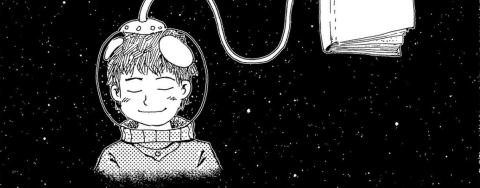
How's your PhD thesis comic stripping?
Since 2021, several PhD candidates from Université Paris-Saclay have been exhibiting their research topic on two comic strips each year. The 'La recherche sort de sa bulle' (Research breaks out of its bubble) project, organised by La Diagonale Paris- Saclay, offers students a series of workshops with illustrator Marine Spaak to help them create their own comic strip. As part of the Science with and for Society (SAPS) label, PhD candidates disseminate their research outside the academic world and to a wider audience.
This article was originally published in L'Edition n.23.
" What is the point of research if it never leaves the lab bench? " This question has been taken up by La Diagonale Paris- Saclay ,the arts, culture, science and society department of Université Paris- Saclay. Its mission is to bridge the gap between scientific activities and the rest of society; it is committed to making science accessible to everyone, by every possible means, and in particular by using visual media. In addition to creating videos, podcasts and board games, Charlène Corty, in charge of scientific outreach at La Diagonale, has been organising 'La recherche sort de sa bulle' workshops for the past two years.
This Université programme is modelled on 'Sciences en bulle' (Science in a bubble), an initiative of the French Ministry of Higher Education and Research (MESR), which selects ten French PhD candidates each year. These ten winners are then asked to write a comic strip on their thesis topic. But, as Charlène Corty points out, " every year, we get several interested people " from all over the Université Paris-Saclay campus. For the past two years, the Université has been offering its PhD candidates an education programme on writing comics. In these workshops, funded by the MESR's SAPS label, interested PhD candidates aim to create two comic strips showcasing their research topic. Accompanied by illustrator Marine Spaak, the students draw up a storyboard, which is a document containing the text, layout and visual ideas for the comic strip. The illustrator then finalises the drawings and colourisation.
Education for PhD candidates
Students develop their own story boards during the four education workshops. They proceed in stages and face a number of challenges. The first difficulty is space constraints: " Two times six comic strips is not a lot ," comments Kévin, who took part in the 2022 edition. So you have to choose the messages you want to get across, prioritise them and, if necessary, sacrifice the less important ones for the sake of clarity.
This first written section precedes the section devoted to the specific features of the comic strip, including the correct division of the message and the message assigned to each box. Finally, the last stage is visual and focuses on sketching the first drawings. For Alice, another participant in the 2022 edition, the challenge is " to illustrate your thesis. It's not easy to use humour ." According to the PhD candidate, the contribution of an outside viewpoint from other PhD candidates as well as nonresearch supervisors during group workshops is invaluable. " They give us feedback that we don't expect at all but which really helps ," says Alice.
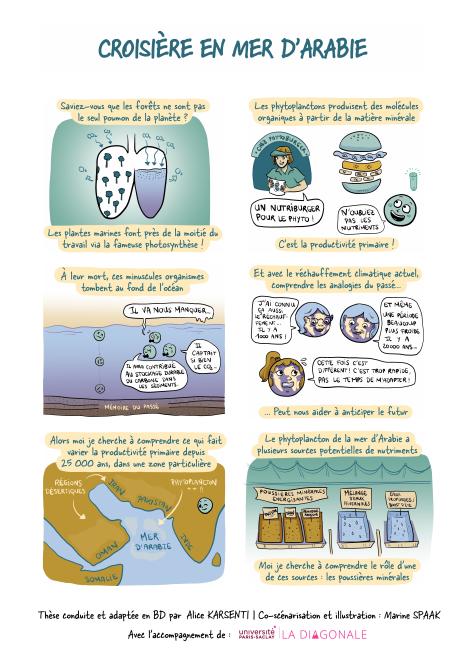
Comics as a special means of disseminating scientific information
For PhD candidates, this experience of writing comics is a step towards improving their ability to popularise science. It can be combined with other programmes run by Université or the MESR, such as ‘Ma Thèse en 180 secondes’ (My Thesis in 180 seconds) or the annual Science Festival. The strength of comics lies in their ability to concentrate a great deal of information, using both text and drawing. " In comics, you can tell a lot of stories in a single box ," notes Alice. Furthermore, visual media are often considered more accessible by the public and help to demystify research. " People close to me pointed out that it was easier to understand my research thanks to comics ," says Kévin.
You can find all the comic strips of 'La recherche sort de sa bulle', including the 2023 creations with the illustrator Alice Varoquaux on the Science & société website .

PhD Comics- Fun Things to PhD!
Doing a PhD is a tedious job we know it right. It is really a serious business to do and that is why it is designated as the highest level of honor in the education system.
The era is of the internet, people are busy doing so much work and social media, rest of the time. Interestingly some people on the internet have created unique things related to PhD, a comic!
A PhD comic makes you laugh and you feel connected immediately because the things are somehow we had faced during our PhD.
So let’s check out some good PhD Comics.
Note: all these PhD comics are taken from the www.phdcomics.com . Their collection is incredible. All images are copyright to the phdcomics.
The first one is the marriage vs the PhD.
The highlight of the comic is that, “foolish young people in love ended in marriage and foolish young people without a job ended in PhD.”
Marriage vs PhD
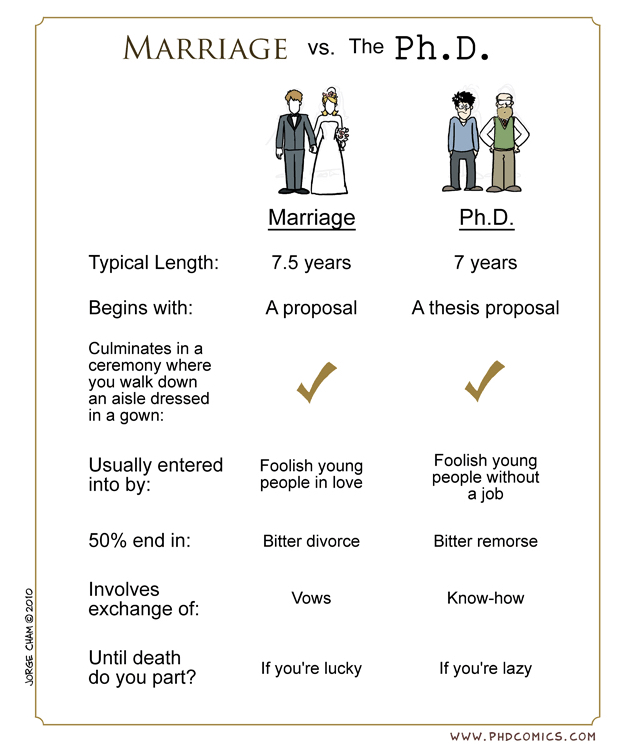
Average time spent composing one email:
This one is a good punch. We should have to write an email with detail and also with “respect”, and our PhD supervisor replies in a single word. That happens to all.
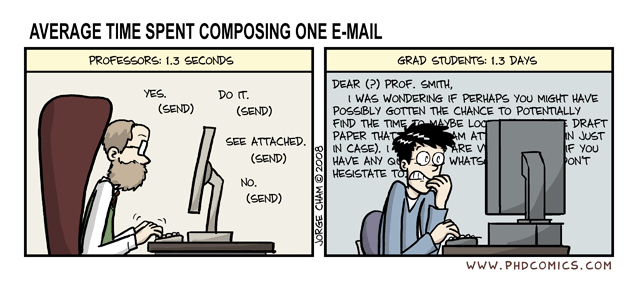
Motivational level graph:
As we starts our PhD we are filled with motivations but as time passes the motivation goes down and frustration level increases.
Every one has faced this final.doc things! even after competing my PhD, i have so many Final.doc, finallll.doc, final01.doc and finallufinal.doc files on my laptop. See the comic:
World cup vs the PhD:
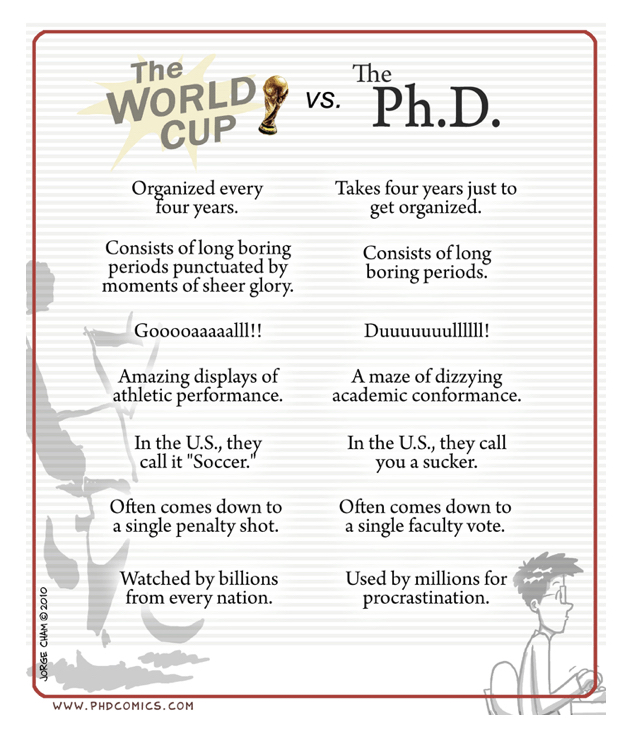
Your thesis committee:
Now this one is a catchy, “impossibly difficult group to get together in one room”. It is true. when we are facing viva none of the faculties have completely read our thesis and though they are giving us suggestions.
Moreover, all have different and opposite openions. but “the guru” is my favourite, only come to get cookies.
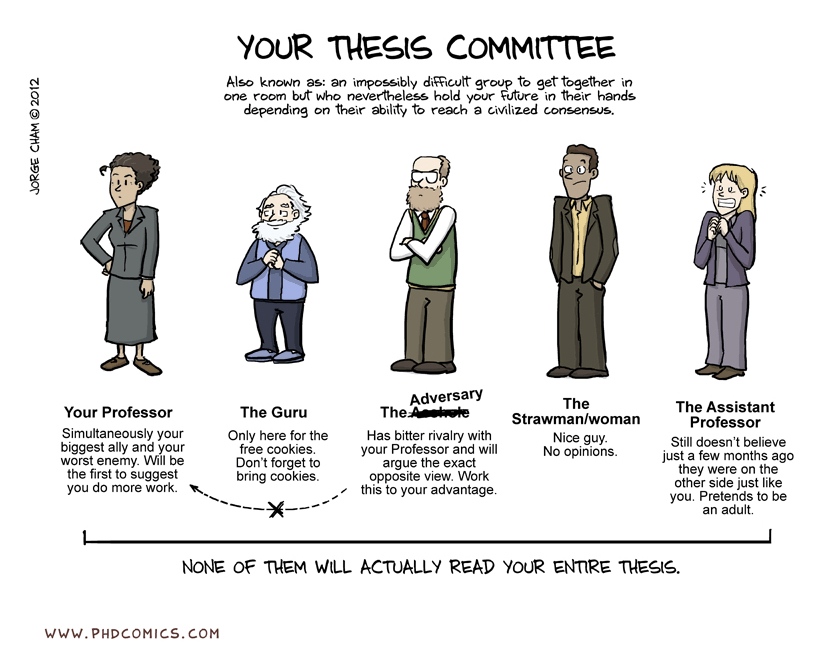
Ninja vs professors:
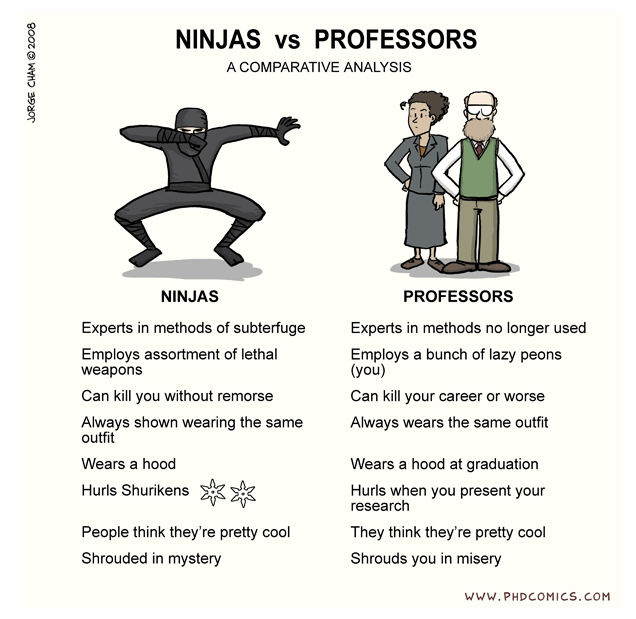
Your computer desktop

happening outside’
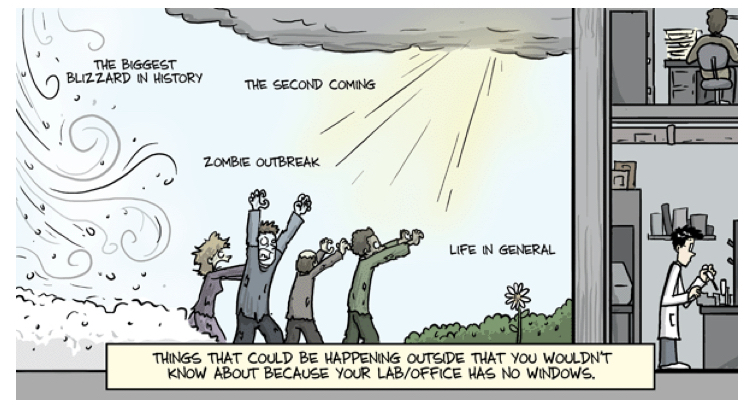
The origin of the thesis
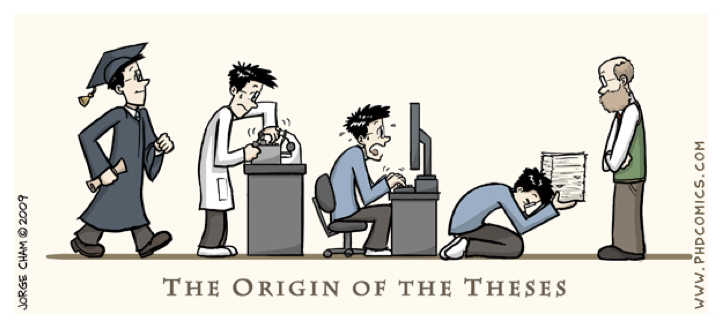
Take it out:
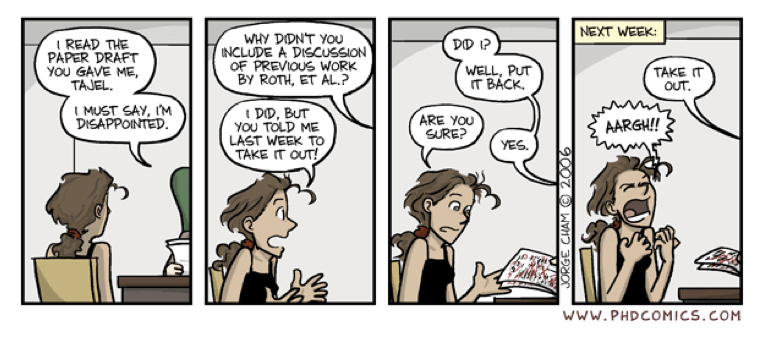
Draft approved
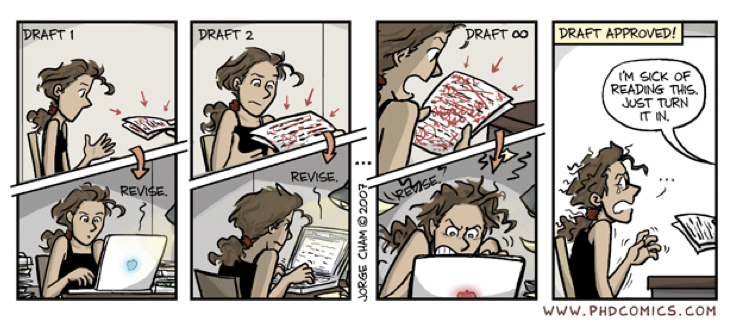
Dr. Tushar Chauhan is a Scientist, Blogger and Scientific-writer. He has completed PhD in Genetics. Dr. Chauhan is a PhD coach and tutor.
Share this:

- Share on Facebook
- Share on Twitter
- Share on Pinterest
- Share on Linkedin
- Share via Email
About The Author

Dr Tushar Chauhan
Related posts.

PhD student- What Skills and Qualities One Should Acquire?
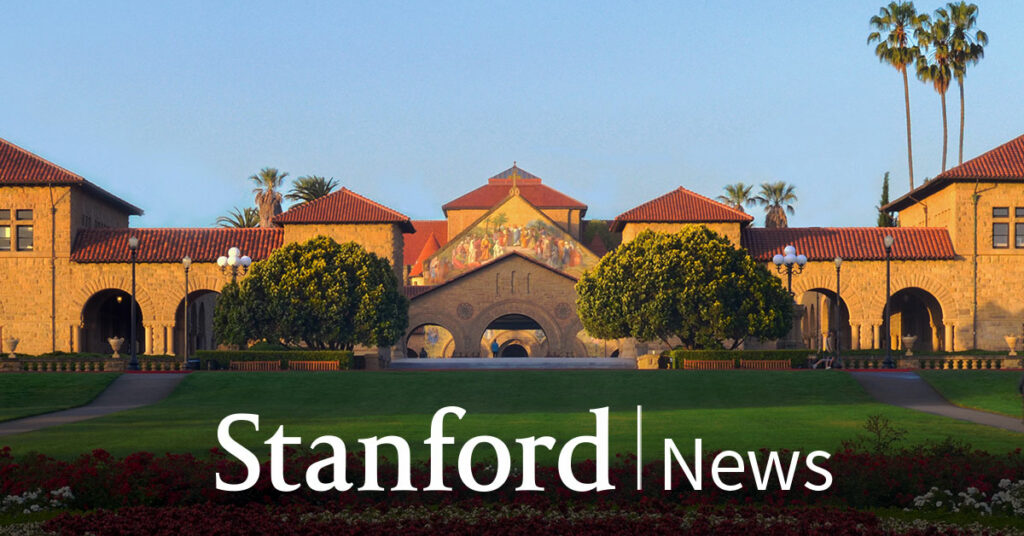
Current PhD programs at Stanford: 2020-21
Leave a comment cancel reply.
Your email address will not be published. Required fields are marked *
Save my name, email, and website in this browser for the next time I comment.
Notify me of follow-up comments by email.
Notify me of new posts by email.
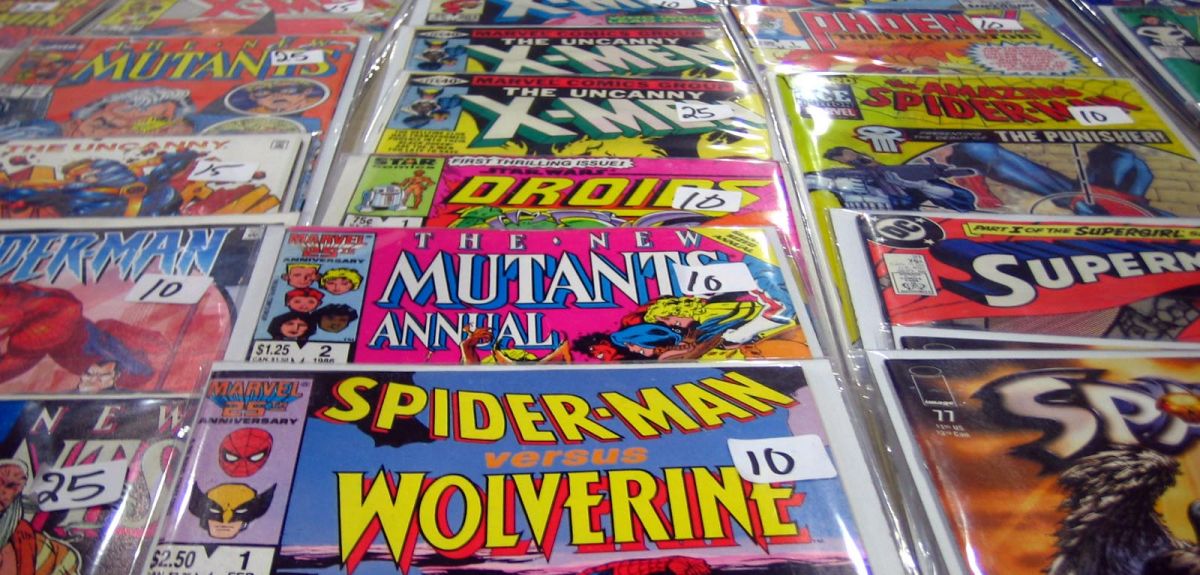
By Debbie R on Flickr, creative commons license
New research networks to study comics
A new research network about comics and graphic novels has been set up by The Oxford Centre for Research in the Humanities (TORCH).
Called ‘Comics and Graphic Novels: The Politics of Form’ , the network will look at questions like why comics are not deemed ‘academic’ and whether traditional critical approaches to literature can be applied to comics.
Dr Dominic Davies, a British Academic Postdoctoral Fellow in the English Faculty, has founded the network. He answers our questions about comics:
Have comics been overlooked in academia? Why do you think this might be?
Yes, comics definitely have been overlooked by many academics. This is in part because, by their very nature, they don’t fit easily into the disciplinary structures that we have today. Are they art? Of course, they certainly are, but because they’re usually collected together in strip or book form, circulated in newspapers or sold in bookshops, rather than hung in museums or galleries, it means they’ve often don’t get the attention of art historians and art theorists.
Conversely, are they literature? Many comics look like books, and there are lots of self-labelled comics short stories and ‘graphic novels’. They have a beginning, a middle and an end, and most of them contain text that drives the narrative forward. But they are, also, fundamentally, groupings of sequential images as well as words. The field of literary studies might have the tools to deconstruct comics’ narrative dimensions, but how can literary academics presume to analyse their visual materials? This is one reason that, in its early incarnations at least, comics studies has mostly been located in media studies departments, sometimes even film studies departments.
However, probably the real reason for the slow uptake of comics by academia is that comics have traditionally been seen as a ‘low’ cultural form, one that is filled with coarse language, silly jokes and subversive sentiments and thus not worthy of critical attention. This is especially the case when they are contrasted with the notion of literature, say, as a ‘high’ cultural form with moral worth. This division still haunts comics, even as they have been embraced by academics in recent years, and causes much self-reflexive debate. It was only with the publications of longer comics such as Art Spiegelman’s Maus, Harvey Pekar’s American Splendour, or Joe Sacco’s Palestine, which move away from conventional superhero stories and tackle complex and serious issues (Spiegelman’s comic is about his father’s time in Auschwitz, for example) that academia started to take them seriously.
So these longer, more obviously ‘serious’ comics, have gained the form recognition in academic circles, and even today academics still tend to focus on them.
Are comics taught in schools and universities? If not, should they be?
Comics mostly aren’t taught in schools. In the U.S., throughout the latter half of the twentieth century when comics production really began to surge, comics were seen not as a medium to help children with their studies, but as distractions—and definitely not something to be studied. This prejudice lingers in education syllabuses today. But there are always exceptions—a comic about anti-apartheid activism is read in schools in Cape Town to educate students about South Africa’s history, for example. And we are seeing comics-only modules cropping up in higher education now.
But this is in large part dependent on whether there is an academic in an English Literature department who happens to have an interest in comics, and the energy to build and offer these modules. One good example is Dr Paul Williams, who has set up a comics-only module at the University of Exeter, and who is coming to give a seminar at our TORCH Network.
As to whether or not comics should be taught in schools and universities, I think the answer is a resounding ‘yes’. The form is so rich, it does so many things that literature or art, as separate mediums, cannot. Indeed, in recent years, there’s been a surge in the kinds of stories that comics are being used to tell—there are now sub-genres within the field, such as autobiographics (autobiographical comics) and comics journalism—and in the popularity of comics, as more and more people find stories they can relate to.
Is there a difference between ‘comics’ and ‘graphic novels’?
That depends on who you ask. As comics have been deemed worthy of academic attention, the term ‘graphic novel’ has become more widely used. This is definitely related to the issue of ‘high’ and ‘low’ forms of culture I mentioned above. The term ‘comics’ is still associated with short strips in newspapers, or superheroes, and these still aren’t really taken seriously. The term ‘graphic novel’ has come to be used by academics to refer to the longer form comic, usually published all in one go as a book – and that is somehow a ‘higher’ cultural form.
It is the term ‘graphic novel’ that high street bookshops such as Waterstones and Blackwell’s use to categorise the comics they sell, and again I think this is related to the idea about what is ‘serious’ literature and worthy of being read by the kinds of people who frequent those stores. While the distinction between the terms ‘comic’ and ‘graphic novel’ has a certain usefulness, there’s a great deal of academic debate about its implicit politics. Graphic novels are still comics, and owe their existence to long histories and rich traditions that extend back into the twentieth century and earlier. Their relabelling as ‘graphic novels’ dismisses this history. Some critics even see the term as being cynically deployed just to make comics more palatable to middle class readerships, academics, and university English departments.
There are numerous other labels that can be used to describe the comics form. I prefer to use the term ‘long-form comics’ rather than ‘graphic novels’ when talking about book-length comics, because it means that we don’t forget the form’s long and valuable history. But it’s important to remember that even under the umbrella term ‘comics’ is a huge diversity of different kinds of reading experience, some of which bear little resemblance to one another.
Discussions around terminologies and definitions have always been at the centre of academic criticism on comics, and these debates are still ongoing, so there’s still no straightforward answer to this question. This Network will include seminars about ‘comics’ and ‘graphic novels’, but will remain self-aware and open to thinking about how these terms are used and what the implications of this usage might be.
Can you apply traditional critical theories to the comic form?
Comics can be analysed with the critical theories that art historians might use, or with other tools from the broader field of visual cultures, such as W.J.T. Mitchell’s work on ‘picture theory’. But since they’re also narratives, literary criticism’s numerous theories such as narratology and discourse, not to mention other fields such as feminist or postcolonial criticism, have a role to play here.
Though comics haven’t had the attention that they deserve from academia, the relatively few critics who have written monographs on them and, in the occasional case, devoted their entire careers to them, have come up with some really sophisticated theories specifically designed for reading comics.
And comics are inherently interdisciplinary, so the tools needed to read them are also interdisciplinary. So it’s really important that our network creates a space for conversations to take place across the traditional disciplinary divides. We’re trying to bring literary critics into dialogue with visual cultures scholars.
And given that the comics and graphic novels we’ll be discussing in the seminars cover such a range of topics, it’s also really important that we welcome historians, geographers, and politics students into the conversation as well. There are also comics being produced in a number of different languages, and so we have committee members from modern languages departments.
How can people get involved and what can we look forward to?
Because the history of comics criticism has always been practiced as much by artists themselves (Will Eisner, Scott McCloud) as it has by academics, we are going to alternate visiting academic speakers with visiting artists to learn more about how actual practitioners go about writing and drawing their comics. So in Michaelmas Term 2016, we have Dr Helen Iball from the University of Leeds talking about autobiographical comics, and Dr Charlotta Salmi from the University of Birmingham presenting some of her recent research on protest and graphic novels in the Middle East.
But we also have some artists coming to present their work and offer their reflections, such as Karrie Fransman, who did a TEDx talk on comics quite recently, and Samir Harb, a geography PhD student at the University of Manchester who is also a published comics artist.
The seminar will run every two weeks throughout term time, and each of these speakers and artists will circulate some comics for participants to read in advance. It’s really important that the Network gets people to actually start reading some comics as well as simply talking and hearing about them.
In addition to the bi-weekly seminars we’ll also have one-off events, in collaboration with other TORCH Networks or other seminar groups based at the university. For example, Jennifer Howell, author of The Algerian War in French-Language Comics (2015), is coming to give a one-off seminar in November 2016.
All will be welcome to attend any of the seminars and talks we’ll be putting on, and we’ll be advertising each event through TORCH, the English Faculty, and various other mailing lists and outlets. In addition, we are currently building up a mailing list of our own, to which you can subscribe by emailing [email protected] or [email protected] . We’ll also be active on social media, so people will soon be able to like us on Facebook and follow us on Twitter, and we’ll feature regular blog posts about comics-related topics on the TORCH website as well.
About Arts Blog
The latest news and views in the arts, humanities and culture at Oxford University. Curated by Sarah Whitebloom, Media Relations Manager (Research and Innovation).
Contact: Sarah Whitebloom, [email protected]

- Comics & Graphic Novels
- Comic Strips

Enjoy fast, free delivery, exclusive deals, and award-winning movies & TV shows with Prime Try Prime and start saving today with fast, free delivery
Amazon Prime includes:
Fast, FREE Delivery is available to Prime members. To join, select "Try Amazon Prime and start saving today with Fast, FREE Delivery" below the Add to Cart button.
- Cardmembers earn 5% Back at Amazon.com with a Prime Credit Card.
- Unlimited Free Two-Day Delivery
- Streaming of thousands of movies and TV shows with limited ads on Prime Video.
- A Kindle book to borrow for free each month - with no due dates
- Listen to over 2 million songs and hundreds of playlists
- Unlimited photo storage with anywhere access
Important: Your credit card will NOT be charged when you start your free trial or if you cancel during the trial period. If you're happy with Amazon Prime, do nothing. At the end of the free trial, your membership will automatically upgrade to a monthly membership.
Return this item for free
Free returns are available for the shipping address you chose. You can return the item for any reason in new and unused condition: no shipping charges
- Go to your orders and start the return
- Select the return method

Download the free Kindle app and start reading Kindle books instantly on your smartphone, tablet, or computer - no Kindle device required .
Read instantly on your browser with Kindle for Web.
Using your mobile phone camera - scan the code below and download the Kindle app.

Image Unavailable

- To view this video download Flash Player

PHD Comics 20th Anniversary Book: The 6th Piled Higher and Deeper Comic Strip Collection Paperback – September 29, 2018
Purchase options and add-ons.
- Print length 200 pages
- Language English
- Publisher Piled Higher and Deeper Publishing, LLC
- Publication date September 29, 2018
- Dimensions 9 x 0.5 x 7.25 inches
- ISBN-10 0972169563
- ISBN-13 978-0972169561
- See all details

Frequently bought together

Customers who viewed this item also viewed
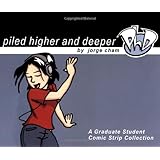
Editorial Reviews
About the author, product details.
- Publisher : Piled Higher and Deeper Publishing, LLC; Anniversary edition (September 29, 2018)
- Language : English
- Paperback : 200 pages
- ISBN-10 : 0972169563
- ISBN-13 : 978-0972169561
- Item Weight : 12.8 ounces
- Dimensions : 9 x 0.5 x 7.25 inches
- #311 in Comic Strips (Books)
- #4,243 in Humor (Books)
Customer reviews
Customer Reviews, including Product Star Ratings help customers to learn more about the product and decide whether it is the right product for them.
To calculate the overall star rating and percentage breakdown by star, we don’t use a simple average. Instead, our system considers things like how recent a review is and if the reviewer bought the item on Amazon. It also analyzed reviews to verify trustworthiness.
- Sort reviews by Top reviews Most recent Top reviews
Top reviews from the United States
There was a problem filtering reviews right now. please try again later..
- Amazon Newsletter
- About Amazon
- Accessibility
- Sustainability
- Press Center
- Investor Relations
- Amazon Devices
- Amazon Science
- Sell on Amazon
- Sell apps on Amazon
- Supply to Amazon
- Protect & Build Your Brand
- Become an Affiliate
- Become a Delivery Driver
- Start a Package Delivery Business
- Advertise Your Products
- Self-Publish with Us
- Become an Amazon Hub Partner
- › See More Ways to Make Money
- Amazon Visa
- Amazon Store Card
- Amazon Secured Card
- Amazon Business Card
- Shop with Points
- Credit Card Marketplace
- Reload Your Balance
- Amazon Currency Converter
- Your Account
- Your Orders
- Shipping Rates & Policies
- Amazon Prime
- Returns & Replacements
- Manage Your Content and Devices
- Recalls and Product Safety Alerts
- Conditions of Use
- Privacy Notice
- Consumer Health Data Privacy Disclosure
- Your Ads Privacy Choices
Thank you for visiting nature.com. You are using a browser version with limited support for CSS. To obtain the best experience, we recommend you use a more up to date browser (or turn off compatibility mode in Internet Explorer). In the meantime, to ensure continued support, we are displaying the site without styles and JavaScript.
- View all journals
- Explore content
- About the journal
- Publish with us
- Sign up for alerts
- News Q&A
- Published: 16 September 2011
PhD comics hits the big screen
- Zoë Corbyn
Nature ( 2011 ) Cite this article
241 Accesses
84 Altmetric
Metrics details
- Science in culture
Movie makes stars out of real-life scientists.
This is a preview of subscription content, access via your institution
Access options
Subscribe to this journal
Receive 51 print issues and online access
185,98 € per year
only 3,65 € per issue
Buy this article
- Purchase on Springer Link
- Instant access to full article PDF
Prices may be subject to local taxes which are calculated during checkout
You can also search for this author in PubMed Google Scholar
Related links
Related links in nature research.
Nature's Future of the PhD special
Related external links
The PhD Movie (including latest screening schedule)
Rights and permissions
Reprints and permissions
About this article
Cite this article.
Corbyn, Z. PhD comics hits the big screen. Nature (2011). https://doi.org/10.1038/news.2011.542
Download citation
Published : 16 September 2011
DOI : https://doi.org/10.1038/news.2011.542
Share this article
Anyone you share the following link with will be able to read this content:
Sorry, a shareable link is not currently available for this article.
Provided by the Springer Nature SharedIt content-sharing initiative
Quick links
- Explore articles by subject
- Guide to authors
- Editorial policies
Sign up for the Nature Briefing newsletter — what matters in science, free to your inbox daily.
Apply for a PhD – Comics Research Hub
Apply for a phd.
UAL has a vibrant community of comics scholars and PhD researchers working on a range of subjects. Find out more about our current comics-based PhD projects. If you would like to discuss studying for a PhD on comics at UAL, the first thing to do is identify relevant researchers who might be able to supervise you. We encourage you to browse our members pages and get in touch for an informal discussion in the first instance.
For more general information on applying and studying for a PhD at UAL, please visit our Research Degrees page .

IMAGES
VIDEO
COMMENTS
view comic: 3225: Addressing Reviewer Comments' view comic: 3215: Average time spent writing one e-mail' view comic: 2888: Analysis of Value' view comic: 2849: Abstract Mad Libs' view comic: 2840: Graph - Motivation level' view comic: 2772: Science News Cycle' view comic: 2563: Your Life Ambition' view comic: 2469: We're all doomed' view comic ...
A PhD Comics special on the occasion of Open Access Week 2012. Piled Higher and Deeper (also known as PhD Comics) is a newspaper and webcomic strip written and drawn by Jorge Cham that follows the lives of several grad students.First published in 1997 when Cham was a grad student himself at Stanford University, the strip deals with issues of life in graduate school, including the difficulties ...
Thesis writing : 1/5/2000: Conference paper : 1/7/2000: So long as we`re not kidding ourselves : 1/12/2000: So long as we`re not kidding ourselves : ... How funny you find PHD Comics : 7/29/2015: Academic Deadlines : 8/7/2015: A Grammatical Conundrum : 8/31/2015: Attachment : 9/4/2015: Sharing : 9/9/2015: Vacation Equation : 9/11/2015: Self ...
Jorge Cham, creator of the cult comic strip Piled Higher and Deeper, or PHD, is probably the most gut-achingly funny/tragic counsellor you could recommend to a PhD student -- or to any confounded ...
The perfect grad student and a chocoholic, it took years for Cecilia to admit she is, in fact, a geek. Brilliant, wily, and usually napping, Mike has been in grad school longer than anyone can remember. His wife and auxiliary source of funding (i.e. "Sugar Mama"), Jen, is hoping he'll graduate soon. Very soon.
Ponder. Hypothesize. Discover. PHD illustrates and communicates the ideas, stories and personalities of researchers, scientists and scholars worldwide in creative, compelling, funny and truthful ...
Publish " Piled Higher and Deeper " (PHD), the popular comic strip about life (or the lack thereof) in grad school. It's free to student newspapers! Though they represent a significant portion of the campus population, grad students often feel ignored and don't pick up the school newspaper. PHD comics gives them something they can relate to and ...
Kay Sohini is a comics-maker and PhD candidate in English at Stony Brook University. She is currently drawing her doctoral dissertation as a comic, which is an auto/ethnographic project about race, gender and illness politics. Her work on comics has been published in Inside Higher Ed, Sequentials, Assay: A Journal of Non-fiction Studies ...
The comic is known for its humor, insight, and relatability. PHD Comics was launched in 1997 and has quickly become a favorite among graduate students and academics alike. The comic has won numerous awards, including the Web Cartoonists' Choice Award for Outstanding Comic Strip.
PHD (Piled Higher & Deeper) is a Satire webcomic by Jorge Cham that has been running since 1997.. The comics depict the typical life of graduate students in Stanford University: how they obsess about ever getting their theses completed, struggle to make ends meet with their meager stipends, wonder why life is passing them by, and slack off while their supervisors aren't looking.
Out there, somewhere, is a woman who writes about comics who wants to turn that writing to a comics dissertation or thesis, or at least I sure hope there is! The field is wide open and ready for more. For the uninitiated, a dissertation or thesis is the long essay or project that serves as the capstone for most advanced degrees (especially ...
For one thing, they've been in grad school for more than 20 years. Amazingly, though, there are three PhD comic strips, and probably only three, that are actually good research advice: Writing your thesis outline. A thesis is daunting. How do you write an entire book over five-plus years?
NEW BOOK! Pre-order now! - I'm SUPER excited to announce my new book Oliver's Great Big Universe is now available to order! It's funny, heart-warming and full of awesome science. Please check it out! NEW TV SHOW! - Check out ELINOR WONDERS WHY the new animated TV show for young kids I co-created! It's about Nature and encouraging kids to follow ...
For PhD candidates, this experience of writing comics is a step towards improving their ability to popularise science. It can be combined with other programmes run by Université or the MESR, such as 'Ma Thèse en 180 secondes' (My Thesis in 180 seconds) or the annual Science Festival.
A PhD comic makes you laugh and you feel connected immediately because the things are somehow we had faced during our PhD. So let's check out some good PhD Comics. Note: all these PhD comics are taken from the www.phdcomics.com. Their collection is incredible. All images are copyright to the phdcomics. The first one is the marriage vs the PhD.
Piled Higher and Deeper. 417,197 likes · 14 talking about this. "Piled Higher and Deeper" (PhD) is the comic strip about life (or the lack thereof) in academia.
Matt Pickles. 11 Jul 2016. A new research network about comics and graphic novels has been set up by The Oxford Centre for Research in the Humanities (TORCH). Called 'Comics and Graphic Novels: The Politics of Form', the network will look at questions like why comics are not deemed 'academic' and whether traditional critical approaches ...
Celebrate 20 years of PHD Comics with us! This sixth collection of comics continues the saga of Cecilia, Mike Slackenerny, Tajel and the Nameless Hero as they deal with tough advisors, frustrating undergrads and writing their thesis. This collection contains exclusive essays by Jorge Cham on why he started drawing the comics, who inspired the ...
Credit: Ben Deverman. The creator of the popular online comic strip ' Piled Higher and Deeper ' has turned it into a feature film. The PhD Movie, which opened this week at a handful of US ...
Tobias J. Yu-Kiener's PhD research is concerned with the current boom in biographical graphic novels about iconic visual artists, their supporting national, international and transnational networks, and their connections to established art museums. In drawing from Art History, Comics Studies, and Cultural Studies, and looking at theories of ...
Apply for a PhD. UAL has a vibrant community of comics scholars and PhD researchers working on a range of subjects. Find out more about our current comics-based PhD projects. If you would like to discuss studying for a PhD on comics at UAL, the first thing to do is identify relevant researchers who might be able to supervise you.
Noubar Afeyan, who received his PhD from MIT in 1987, co-founded Moderna, one of the companies which produced a COVID-19 vaccination in the wake of the pandemic.